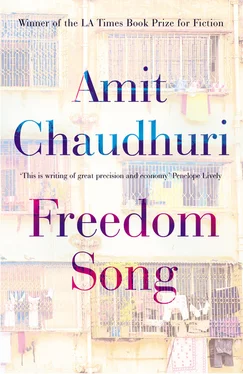Uma had stopped eating; her right arm was poised in mid air.
‘What do you think you are doing?’ she asked again. ‘You’re lucky I’m not going to throw the egg into that corner’—she gestured with her head—‘because I don’t want to dirty the kitchen and upset mashima. But I’ll tell mashima about you.’
Nando stared at his plate. Of late their quarrels always came to these exchanges. Nando was allowed an extra egg daily by Khuku, not because of favouritism but because not long ago he’d been suffering from tuberculosis. He’d contracted it during a spell of unemployment — after being sacked by Khuku — which he’d spent at home, in a basti near Tollygunge, before a reconciliation brought him back to the job.
During the curfew a month ago, all had been disorder and silence. Jochna, who was becoming increasingly pretty, had not been able to come to work for two days; there had been tension in her area and fear of violence. It was at such times that the sketchy unfencedness of their existence became palpable, that they must lead lives perpetually and nakedly open to duress. The Muslims had taken out a procession; at night, when usually an owl — Lakshmi’s ancient companion and carrier — hooted near the railway crossing, with a tremulous sense of something about to happen, Jochna and her family and other Hindus in the basti had been moved to a nearby Christian school, while the furious Muslims apparently congregated and went about shouting and protesting. So Jochna did not come to work for two days. Ordinarily this would have irritated Khuku, but this time the atmosphere, distant but palpable, of strife precluded any response, unfortunately, except sympathy.
Nando had spent most of his life in Calcutta; he had started out when he was a young man as an assistant to a cook in a sweet-shop. He could not read a single word in any alphabet. In his own home, this small swaggering man would behave like a patriarch and a pest, something between a monarch and hapless vermin, and was considered a nuisance by his wife and even beaten by his son when he drank. He had a grandson, not much shorter than him, who was his only well-wisher; but being at home wrecked his health. Not long after she had taken him back, Khuku had heard him coughing, and saw him lying about like a sack on the carpet, utterly tired. Dr Mitra, who lived nearby, had come down to take a look at this fatigued specimen, and had advised that a test be done, for TB. Apparently it was still widespread in the bastis and areas these people lived in. ‘The only difference is that it’s as curable as toothache today,’ said Dr Mitra. When Khuku had had his sputum tested, the bacillus had been found in it; but, as good as Dr Mitra’s word, he was cured now (that had happened two years ago).
Half in her sleep, Bhaskar’s mother had been seeing them going up, the collapsible gate opening, shutting, opening, shutting, the voices in Vidyasagar Road coming down the narrow passage way by the house, and then coalescing and coming up the stairs. She needed her sleep; or else she had migraines. From outside came the sound of the occasional bus or car passing down the road; long deafening horns. But nothing frightened the crows.
The boys went straight up to the second storey, and there began their rehearsals. Bhaskar’s mother could hear their voices, far away; she was half dreaming and half listening. Upstairs, they were practising their lines between the bed and cupboards and dressing-table; from time to time, one or two of them wandering to look out at the street and the houses on the opposite side. ‘Whose house is that, Bhaskarda?’ asked Dipen, clutching a mullion and pushing aside a fragment of a curtain and pointing to the house that the window looked out upon. ‘That’s the advocate’s house,’ said Bhaskar. ‘The advocate died when I was ten, but we still call it the advocate’s house.’ ‘Bhaskarda! Tell Deepu to shut up so that I can say my lines!’ said Dhruba, standing in front of the bed. His ‘lines’ were really an inarticulate roar. A man called Mahesh in a rather dirty dhoti was sitting on the floor with a dholak on his lap; he’d brought it to beat out a rhythm during the chants. But the sounds they made were always being overpowered by the single-minded, protracted hooting of state transport buses. ‘We can use my house for rehearsals,’ Bhaskar had offered generously; and this explained their presence here.
‘OK, let’s repeat the lines!’
‘Dhiren, stand in place!’
‘Allah-hu-akbar!’
‘Allah-hu-akbar!’
And then:
‘Let’s have a tea break. .’
They tried their best to simulate the feeling of performing on the streets, and the atmosphere of the street-play they were preparing for, which was two weeks away. They went over their rudimentary but voluble roles with enthusiasm. They loved the freedom and heat of performing on the streets, of being uncircumscribed by the proscenium, the proximity and palpability of the houses that bordered their performance, their gestures spilling over onto the pulse of the ragged audience, the nearness of the street-sky; and they loved the exaggerated sketchiness of their own rehearsals, the lines never wholly or faithfully committed to memory.
‘Haridasi!’ sighed Bhaskar’s mother downstairs, still lying in bed. ‘Haridasi!’ When the girl had finally appeared, she said, her voice a decibel lower and deeper after her nap, ‘Take them tea upstairs.’ As Haridasi was turning to go, she said, ‘And listen! Give them some biscuits — those biscuits we bought a few days ago.’
Sometimes when Bhaskar’s mother heard them rehearsing she thought about Bhaskar worrying for the poor people in the world and she thought just how difficult a place to live in and understand the world was. Look after your own, was her own view.
And she was filled with an apprehension that couldn’t be put in words when she heard their voices.
Yet he wasn’t going to listen; he must give five hundred rupees of the two thousand he earned to the Party.
Unlike her husband, she had a sharp business sense; but her energies must be devoted to the housekeeping accounts. These she kept with great meticulousness, and zeal, little figures and computations inside a note-book. Meanwhile, it was left to her husband and now her son to preside over the business.
She thought, at times, of the family house in Shyambazar. During her childhood she had not known what it meant to live anywhere but in a great mansion with many rooms, so prosperous that she had not had any idea of penury.
She had left the house when she’d been eighteen, after getting married, though she kept going back to it for this or that festival. But after her father died she didn’t feel the urge to visit it as frequently as she had before; it was as if her ties had been loosened a little; even her ties to the world had been loosened slightly, and, although her ambitions and concerns for her children were still in place, it was almost as if she’d let go.
Even her children did not know if they knew her completely. Now, she rubbed her eyes absently in her half-sleep. It was when Bhaskar and Manik were growing up that her life had passed through its worst phase, with Bhola’s business going bankrupt. She had been, then, for the first time, full of fear.
Her innate business sense (which she must have inherited from her father, and which had never been put to use) had made her, recently, create a savings account whose foundations had been laid by a sum left in her father’s legacy, and she would not let Bhola tamper or interfere with the savings for the purpose of his business; at first, she had not even told him about it. But mixed up with this hard-headed sensibleness were also shades of spiritualism, of irreducible faiths, and thus, there hung in the big room on the second storey, above the clothes-horse, a picture of Ramakrishna sitting cross-legged, and, next to it, a picture of his wife, Sharada Devi. Lakshmi, Saraswati, Kartik, and Krishna sat in the prayer-room, in some way involved with the destinies in this house. This was one side of her that no one could plumb, where this accessible and ever-smiling woman was most herself, and where also lay, not in a rational way, her hopes and fears for Bhaskar, Manik, Piyu, Bhola and herself, in that order.
Читать дальше












